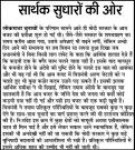No surprises in budget editorials

THE HINDI PRISM
Anand Vardhan
The various analyses of the budget were a reminder that the terms of discourse, like the terms of trade, are favourable to some and unfavourable to others. This explains the inevitability with which post-budget editorial commentaries and opinion pieces offered arguments supporting their ‘verdict’ (as if that wasn’t known) on the budget along entrenched partisan lines.
To a large extent, the edit and opinion pages of the English dailies were guilty of offering diatribes based on pre-determined positions and masquerading as analysis but did the Hindi press also share this feature?
Dainik Jagran was forthcoming in its endorsement of the budget which it saw as reform-oriented, forward looking and a necessary precursor to a visionary policy framework. In its edit (Saarthak Sudharon Ki Ore, Towards Meaningful Reforms, July 11), the paper said (as translated from Hindi): ‘Despite adverse conditions, the Finance Minister has tried to give something to every section and has made all possible efforts to pave the way for economic reforms. What can’t be ignored is that the Modi government has laid the foundation of some basic reforms. It augurs well that the new government has the political will and has the strength to take necessary decisions as well as implement them”.
This assessment turned out to be the running thread in the other budget-related articles in the daily, including the Sunday piece by its editor Sanjay Gupta (Naye Nazariye ki Jhalak, Glimpse of New Viewpoint, July 13) and Manisha Priyam’s article (Nayee Aarthik Disha Mein Desh), Country in a New Economic Direction, July 11).
You might ask, would Dainik Jagran take it as a compliment or an indictment if it were to be called The Pioneer of the Hindi press?
Of late, Dainik Bhaskar has shrunk the space for edits and opinion pieces, and the op-ed page is extinct (the dubious inspiration for which is not hard to find in similar decisions by some English dailies). Dainik Bhaskar chose not to have an editorial comment on the budget and instead spoke editorially through its group editor Kalpesh Yagnik’s column against one specific budget proposal on setting up five new IITs and IIMs (IIT-IIM Shiksha ke Supreme Court Jaise Ho, Jan-Adaalton Jaise Nahi, IIT-IIM Should Be Like Education’s Supreme Court, Not Mass-Hearing Courts, July 12).
Interestingly, it’s the column by Ved Pratap Vaidik (who is in the headlines for a different reason) which somehow refutes as well as vindicates the current debate around his meeting with Hafeez Saeed. In coming down heavily on what he calls a UPA-replica budget, Vaidik belies the charge of his proximity to the Modi regime. However, by lambasting the government for its silence on how to recover black money, he seems to be advocating a pet theme of yoga guru Baba Ramdev to whom he is believed to be quite close.
The budget commentaries in the Hindi dailies point to a serious gap in the in-house economic expertise available to them, a symptom of a larger malaise which this column has briefly addressed in an earlier piece.
Though the opinion pages are sometimes enriched by the contribution of analysts whose natural habitat is the English media, the preponderance of such columnists reflecting on economic affairs in the Hindi dailies might be a good way of filling translators’ pockets but exposes the outsourcing syndrome in Hindi discourse. From Professor Y K Alagh to Gurcharan Das, the budget analysis in the Hindi papers is banking on translators’ sweat.
The clichéd narrative and partisan lens are inevitable when one has chosen to pre-judge the budget. Amar Ujala, Paranjoy Guha Thakurta‘s piece, which is rhetorically headlined Karwi Dawa Kahan Hai? (Where is the Bitter Medicine?, July 11) reads like a pre-determined conclusion of a reductionist argument – that the economic agenda of the BJP and the Congress have nothing different to offer.
Given his criticism of the policy framework of the Modi regime in general, you wonder what Thakurta would have said if the bitter medicine had indeed been in the budget. Perhaps Why This Bitter Dose? Who Stands to Gain from the Jaitley Medication?
For that matter, given Jansatta’s vehement anti-Modi tirade throughout the general election campaign, it wasn’t surprising that the paper, in its editorial comment, dismissed the budget as Niraasha Ka Vitt (Finance of Despair, July 11).
And yet, there were some surprises. In a marked departure from its pro-Congress editorial leanings, Hindustan (as well as its flagship English daily The Hindustan Times) expressed appreciation of what it thought was the key message of the budget. In its edit (Budget ka Sandesh, Budget’s message, July 11) , the paper remarked: “The budget is short on big ticket announcements but there is an assurance that whatever has been proposed would be adhered to and implemented. The implicit message is that the bitter medicine for the economy, which the Prime Minister and the Finance Minister have been talking about, would also come but people need not be scared of that’.
What was missing in the Hindi press discourse on the budget was some insightful reflections of the kind that appeared in the English press from two analysts who ideologically are poles apart and took different perspectives. Remarkably - and refreshingly - neither are economists by academic training nor business/finance columnists.
Political scientist Pratap Bhanu Mehta’s incisive critical take on the deeper issues plaguing the budget (Building Half Bridges, The Indian Express July11) and right wing political commentator Swapan Dasgupta’s perceptive diagnosis of some of the governance challenges emanating from the budget (Why the FM Chose to be Reconciled to a Flawed Inheritance? Sunday Times of India, July 13) offered fresh insights.
The only response possible when going through the predictable certainties of our analysts and commentators (who are proliferating in all sorts of media) is ennui. In this regard, the Hindi press offered no break with this frozen continuity; the numbers were crunched and the views articulated to suit the pre-set boxes of the pro/anti binary.